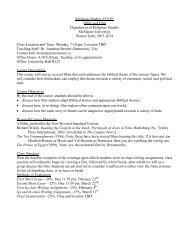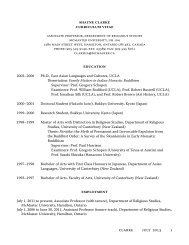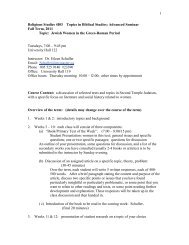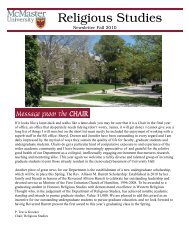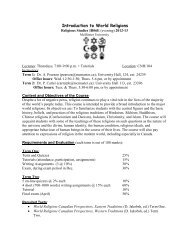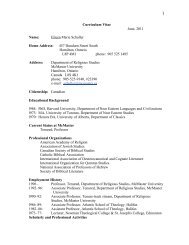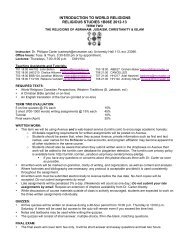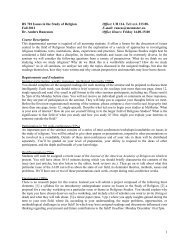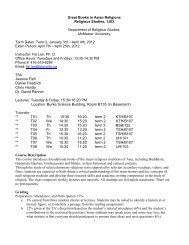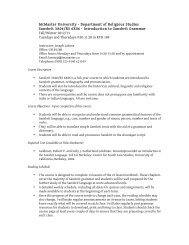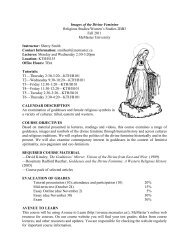701 outline (draft) - Department of Religious Studies
701 outline (draft) - Department of Religious Studies
701 outline (draft) - Department of Religious Studies
Create successful ePaper yourself
Turn your PDF publications into a flip-book with our unique Google optimized e-Paper software.
Course Outline (<strong>draft</strong> version, to be revised)<br />
<strong>Religious</strong> <strong>Studies</strong> <strong>701</strong><br />
Issues in the Study <strong>of</strong> Religion<br />
Term 1, 2011-12<br />
Pr<strong>of</strong>essor: Zdravko Planinc<br />
Office: UH 111<br />
Telephone: x. 23394<br />
E-mail: planincz@mcmaster.ca<br />
Office hrs: Wednesdays, 3:30-4:30; or by appointment<br />
Course description<br />
This departmental seminar is required <strong>of</strong> all incoming students. It <strong>of</strong>fers a forum for the<br />
discussion <strong>of</strong> issues central to the field <strong>of</strong> <strong>Religious</strong> <strong>Studies</strong> and for the exploration <strong>of</strong> a variety<br />
<strong>of</strong> approaches to investigating religious traditions, texts, institutions, ideas, experiences and<br />
practices. Since <strong>Religious</strong> <strong>Studies</strong> might best be considered a field rather than a discipline, its<br />
theories, methods and issues can be extremely diverse. In the seminar we will consider the<br />
following questions from a variety <strong>of</strong> perspectives: What do we think we are studying when we<br />
study religions? Why do we think this is a worthwhile endeavour? How do we study religions?<br />
As in all seminars, we study not only the topics discussed in the assigned readings, but also the<br />
readings themselves, how they were written, why certain perspectives and materials were<br />
chosen, and so on.<br />
Assignments and evaluation<br />
1. Seminar conference (15%)<br />
For the Oct 5th seminar, each student will either (a) present one <strong>of</strong> the chapters in the<br />
Taylor collection (written and sent to the discussant in advance) or (b) present a (written)<br />
critique <strong>of</strong> another student's presentation. The class will discuss each pair <strong>of</strong><br />
presentations briefly.<br />
2. Seminar presentation (30%)<br />
For one <strong>of</strong> the six seminars from Oct 12 to Nov 16, each student will either (a) present<br />
the week's readings (written and sent to the discussant in advance) or (b) present a<br />
(written) critique <strong>of</strong> another student's presentation. For each seminar, both students<br />
presenting will be responsible for initiating and leading the class discussion.<br />
3. Research paper (40%)<br />
Each student will write a research paper (length to be determined) analyzing the readings<br />
for the week in which he or she was a presenter or discussant, incorporating all relevant<br />
aspects <strong>of</strong> the presentation, critique, and class discussion.<br />
4. Class participation (15%)
Seminar schedule<br />
1. Sept. 14 Introductory meeting<br />
1. Each student should be prepared to present a short intellectual biography.<br />
Describe your previous studies, your areas <strong>of</strong> interest, and your career ambitions.<br />
2. Class organization and assignments<br />
3. Discussion: The state <strong>of</strong> the academy – a stark perspective<br />
• Thomas Benton, "Graduate School in the Humanities: Just Don't Go," The<br />
Chronicle <strong>of</strong> Higher Education (30 Jan. 2009); and "Just Don't Go, Part 2," The<br />
Chronicle <strong>of</strong> Higher Education (13 Mar. 2009).<br />
• Brian Croxall, "The Absent Presence: Today's Faculty," paper prepared for<br />
2009 MLA Convention, available on the author's website at:<br />
.<br />
• Thomas Benton, "The Big Lie About the 'Life <strong>of</strong> the Mind'," The Chronicle <strong>of</strong><br />
Higher Education (8 Feb. 2010).<br />
• Thomas Benton, "A Perfect Storm in Undergraduate Education, Part 1," The<br />
Chronicle <strong>of</strong> Higher Education (20 Feb. 2010); and "Part 2," The Chronicle <strong>of</strong><br />
Higher Education (3 Apr. 2010).<br />
2. Sept. 21 The state <strong>of</strong> the discipline<br />
• Ann Taves, "2010 Presidential Address: 'Religion' in the Humanities and the<br />
Humanities in the University," Journal <strong>of</strong> the American Academy <strong>of</strong> Religion 79/2<br />
(2011), 287-314.<br />
• Proceedings <strong>of</strong> the 2005 Conference, "<strong>Religious</strong> <strong>Studies</strong> in Canada: Past,<br />
Present, and Future," published in <strong>Studies</strong> in Religion / Sciences Religieuses<br />
35/3-4 (2006).<br />
= Michel Gardaz, "Editor's Preface: The past meets the present: <strong>Religious</strong><br />
<strong>Studies</strong> in Canada," 383-7.<br />
= Harold Coward, "Taking its interdisciplinary heritage seriously: The future <strong>of</strong><br />
<strong>Religious</strong> <strong>Studies</strong> in Canada," 403-412.<br />
= Donald Wiebe, "The learned practice <strong>of</strong> religion: A review <strong>of</strong> the history <strong>of</strong><br />
<strong>Religious</strong> <strong>Studies</strong> in Canada and its portent for the future," 475-501.<br />
= Michel Desjardins, "What the Canadian doctoral programs tell us about the<br />
academic study <strong>of</strong> religion in Canada," 505-515.<br />
= Aaron Hughes, "Outside looking in, inside looking out: An epilogue (<strong>of</strong><br />
sorts)," 561-575.<br />
3. Sept. 28 Library / Grants – TBA<br />
4. Oct. 5 Seminar conference<br />
• Mark Taylor, ed., Critical Terms for <strong>Religious</strong> <strong>Studies</strong> (University <strong>of</strong> Chicago<br />
Press, 1998).
5. Oct. 12 Scholarship and critique (1)<br />
• Clifford Geertz, The Interpretation <strong>of</strong> Cultures: Selected Essays (Basic Books,<br />
2000 editon), selected chapters.<br />
• Talal Asad, "Anthropological Conceptions <strong>of</strong> Religion: Reflections on Geertz,"<br />
Man, New Series, 18/2 (1983), 237-259.<br />
6. Oct. 19 Scholarship and critique (2)<br />
7. Oct. 26 Religion(s)<br />
• Symposium on Donald Lopez Jr's Prisoners <strong>of</strong> Shangri-La: Tibetan Buddhism<br />
and the West, in Journal <strong>of</strong> the American Academy <strong>of</strong> Religion 69/1 (2001).<br />
= David Germano, "Encountering Tibet: The Ethics, Soteriology, and Creativity<br />
<strong>of</strong> Cross-Cultural Interpretation," 165-182.<br />
= Tsering Shakya, "Who Are the Prisoners?," 183-9.<br />
= Robert Thruman, "Critical Reflections on Donald Lopez Jr's Prisoners <strong>of</strong><br />
Shangri-La," 191-201.<br />
= Donald Lopez Jr, "Jailbreak: Author's Response," 203-213.<br />
• Russell McCutcheon, "The Category 'Religion' in Recent Publications: A<br />
Critical Survey," Numen 42/3 (1995), 284-309.<br />
• Robert Ford Campany, "On the Very Idea <strong>of</strong> Religions (in the Modern West<br />
and in Early Medieval China," History <strong>of</strong> Religions 42/4 (2003), 287-319.<br />
• Gregory Schopen, "Archaeology and Protestant Presuppositions in the Study <strong>of</strong><br />
Indian Buddhism," History <strong>of</strong> Religions 31/1 (1991), 1-23.<br />
8. Nov. 2 Reading (and writing)<br />
• Paul Griffiths, <strong>Religious</strong> Reading: The Place <strong>of</strong> Reading in the Practice <strong>of</strong><br />
Religion (Oxford University Press, 1999), selected chapters.<br />
• Recommended: Stanley Fish, How to Write a Sentence: and How to Read One<br />
(Harper, 2011); and Joseph Epstein, "Heavy Sentences," The New Criterion 29<br />
(June 2011).<br />
9. Nov. 9 Islamic <strong>Studies</strong><br />
• Richard C. Martin, "Islamic <strong>Studies</strong> in the American Academy: A Personal<br />
Reflection," Journal <strong>of</strong> the American Academy <strong>of</strong> Religion 78/4 (2010), 896-920.<br />
• Rebecca Chopp, "Presidential Address: Beyond the Founding Fratricidal<br />
Conflict: A Tale <strong>of</strong> Three Cities," Journal <strong>of</strong> the American Academy <strong>of</strong> Religion<br />
70/3 (2002), 461-474.<br />
• A selection from the following papers and chapters, all <strong>of</strong> which are available<br />
on the author's website .<br />
= Carl Ernst, "The West and Islam? Rethinking Orientalism and Occidentalism."
= Carl Ernst, "It's Not Just Academic – Writing Public Scholarship in Middle<br />
Eastern and Islamic <strong>Studies</strong>," (forthcoming, Middle East <strong>Studies</strong> Association<br />
Bulletin).<br />
= Carl Ernst, "Reading Strategies for Introducing the Qur'an as Literature in an<br />
American Public University" (Islamic Research Institute, Islamabad), Occasional<br />
Papers no. 77.<br />
= Carl Ernst and Richard C. Martin, "Introduction: Toward a Post-Orientalist<br />
Approach to Islamic <strong>Religious</strong> <strong>Studies</strong>," in their Rethinking Islamic <strong>Studies</strong>:<br />
From Orientalism to Cosmopolitanism (University <strong>of</strong> South Carolina Press,<br />
2010).<br />
10. Nov. 16 Post-colonial critical theory<br />
• Susan Buck-Morss, Hegel, Haiti, and Universal History (University <strong>of</strong><br />
Pittsburgh Press, 2009).<br />
11. Nov. 23 Class canceled for AAR Annual Meeting<br />
12. Nov. 30 Concluding discussion – TBA



